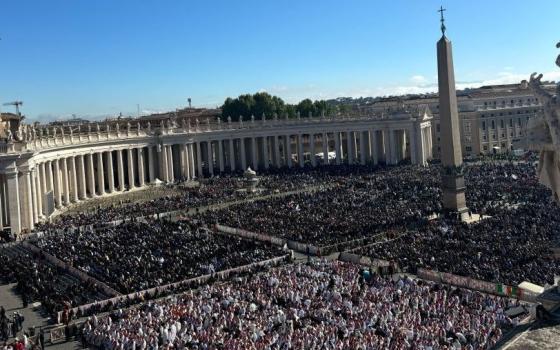We have only one, very short document written about Jesus during his own lifetime: the inscription explaining the reason for his execution. Luke quotes it as saying: "This is the King of the Jews." Short as it is, it has the power to indict everyone who contemplates it.
 The accusation, which John tells us caused controversy as soon as Pilate wrote it, explains the government's reason for executing Jesus. He was subversive. He refused to worship at the altars of imperial power where people are coerced to accept that might makes right. Jesus was charged with atheism, with sedition regarding the gods and rulers of his day. The alternative he offered was the God who wielded the power of merciful love as the only option to a world of violence, division and death.
The accusation, which John tells us caused controversy as soon as Pilate wrote it, explains the government's reason for executing Jesus. He was subversive. He refused to worship at the altars of imperial power where people are coerced to accept that might makes right. Jesus was charged with atheism, with sedition regarding the gods and rulers of his day. The alternative he offered was the God who wielded the power of merciful love as the only option to a world of violence, division and death.
| Solemnity of Christ the King |
| 2 Samuel 5: 1-3 Psalm 122 Colossians 1:12-20 Luke 23:35-43 |
The religious leaders near the cross inadvertently revealed their core creed, saying, "If he's God's chosen one, he should save himself." Their theology was clear: "God helps us to help ourselves." They were heirs to the same faith tradition as Jesus but rejected the lens through which he read it.
The soldiers, not much given to original thought, summarized the civil and religious positions with their jeering judgment that anybody who was aligned with the powerful should be able to muster self-serving force. All of these actors were putting Jesus' theology on trial. Would Jesus' God save him or prove impotent when confronted with the powers of palace and temple?
In Jesus' last moments on earth, Luke allowed two criminals to focus the question of the ultimate meaning of his life. The first agreed with the forces that had seemingly brought Jesus to this moment. "Are you not the Christ? If you are, then work the miracle! Dazzle and compel them to believe in you! And, by the way, bring us along on the getaway." With his final breath, this man spoke for all who believe in the definitive power of domination and ultimate value of self-preservation.
The other criminal became the Gospel's final and perhaps most unanticipated model disciple. Like the humble tax collector of Jesus' parable on prayer, his focus was on God and the blameless man who shared his fate. Unlike anyone else in the scene, he perceived God's presence in the innocent victim by his side. This criminal alone grasped the mystery that the King of the universe was powerful enough to lay down his life, trusting only in God.
Understanding this, he could turn to Jesus and pray, "Remember me when you come into your kingdom." He was perhaps the only person present at that moment who desired a place in Jesus' kingdom, and thus he was a comfort to Jesus, even as Jesus promised him salvation.
Today's feast invites us to contemplate the crucifix as we hear the proclamation, "He is the image of the invisible God." This image of Christ the King puts all our ideas about God on trial. This image of Christ the King demands a response from us. We either ask to be a part of his reign or we choose to try to save ourselves.
We see here the God who comes to save, no matter the cost. We see here the God who knows nothing of coercion except its impotence when confronted by love.
Luke invites us to look at the Christ and call him our King. Aware of what it costs, we are invited to repeat our Easter proclamation, "This is the faith we are proud to profess."
As we meditate on what it means to call this Christ our King, we understand the insight of the criminal who didn't ask Jesus to work any more of a miracle than to love him beyond death. He understood that Jesus needed no saving. He realized that Jesus wasn't seeking an escape, because the cross revealed who he was as the Word made flesh, in solidarity with humanity and trusting the Father.
This criminal, one of the most wretched of humankind, understood that God was by his side. He prayed, "Remember me."
And as Jesus replied, "This day …", he declared that man "fit to share the inheritance of the saints in light" (Colossians 1:12).
The feast of Christ the King of the Universe is a triumphant celebration of God's reconciling love, of divine solidarity with humanity, of God's love for us at our neediest. The image of Christ the King on the cross proclaims God's presence with us in our most wretched moments, offering us a love and salvation we could not deserve at our best. This is the feast of the indomitable power of love.
What better start to our week of Thanksgiving? Let the lowly hear and rejoice!
[Mary M. McGlone is a Sister of St. Joseph of Carondelet. She is a freelance writer and executive director of FUVIRESE USA, a charitable foundation that supports work with people with disabilities in Ecuador.]




